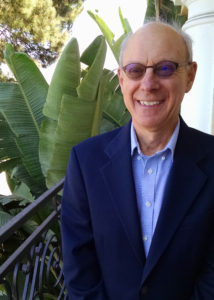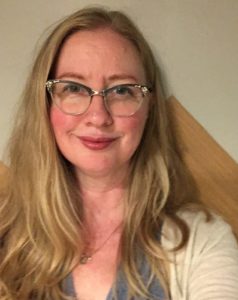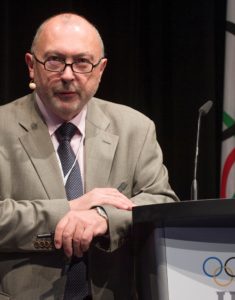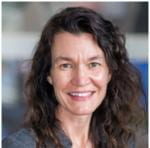2019 Award Recipients

 AMIA’s Silver Light Award recognizes outstanding career achievement in moving image archiving. It recognizes substantial contributions to the field over an extended period, leadership in the field, preservation and restoration projects, innovations that advance the cause of preservation in archives and archival projects.
AMIA’s Silver Light Award recognizes outstanding career achievement in moving image archiving. It recognizes substantial contributions to the field over an extended period, leadership in the field, preservation and restoration projects, innovations that advance the cause of preservation in archives and archival projects.
EDDIE RICHMOND
“Eddie Richmond participated in FAAC/TAAC, FIAF and various public grants panels. He was deeply involved in the creation of AMIA, served as President, was instrumental in creating AMIA’s scholarship program, and served as Education Committee chair as well as a number of other volunteer duties over the years. He has also contributed to the drafting and implementation of many of the standards in our field.
For nearly four decades, Eddie was one of the principle executives of the UCLA Film and Television Archive. In that capacity, he interacted with a vast number of individuals – scholars and students, archivists and technicians, artists, donors and depositors, institutional leaders and funders. He shaped nearly every facet of the archive from training and professional development of the staff and support of UCLA’s MIAS program, to grant maintenance and oversight of preservation work to cataloging and use of the collection. Eddie’s tenure saw the archive grow from a few hundred titles to over 200,000 – the second largest public archive in the United States. Always been among the most collaborative archivists, the range of Eddie’s many activities extend to the most important institutions across the globe.
Beginning in the 1980s, Eddie worked with the Packard Humanities Institute to implement a significant and continuous funding stream in support of UCLA’s preservation program. This work included the creation of an in-house film lab, and then the construction of a large nitrate storage facility. Shortly thereafter, his ongoing work with PHI helped lead to the construction of the PHI Stoa, with facilities to accommodate safety film, a new laboratory, projection rooms, and work space. Eddie took UCLA’s collection from rented space in a deteriorating film exchange built in the early 1900s to a post-modern architectural fantasy equipped to take the archive through the new century.” – Nomination Statement

 The William S. O’Farrell Volunteer Award recognizes significant contributions to AMIA and to the field. The Award is named for long-time member Bill O’Farrell and honors all that Bill did for the Association, the mentoring role he played over the years to so many archivists, and his contribution to the field.
The William S. O’Farrell Volunteer Award recognizes significant contributions to AMIA and to the field. The Award is named for long-time member Bill O’Farrell and honors all that Bill did for the Association, the mentoring role he played over the years to so many archivists, and his contribution to the field.
SNOWDEN BECKER
Snowden Becker holds a BFA in Printmaking from the Maryland Institute, College of Art in Baltimore, an MLIS from UCLA, and most (but not all) of a PhD in Information Studies from UT Austin. She first attended AMIA in 2001, and has been active on a number of committees and interest groups since then, in addition to being twice elected to the AMIA Board. She has worked with motion picture materials in a range of collection contexts, from museums and libraries to law enforcement agencies, and from 2012-2019 she managed the graduate programs in AV archiving and Library and Information Science at UCLA.
“Snowden Becker is the glue between dozens of archival communities that all overlap because of her commitment and involvement in the field. She is an advocate and mentor for those who aim to contribute to media archival scholarship and praxis, and a vigilant promoter of good work being done in the archival community. Snowden Becker is gracious, kind, and stern when she needs to be. But, over all of this – she has made her life a dedication and tribute to media preservation and those within the profession who venture to do the same.
Snowden has been a fixture at AMIA Conferences and events for many years, but her emphasis has been to impart knowledge and help others gain the most out of their conference-going experience. Snowden has served as an AMIA Director of the Board and Committee Chair, and as a Conference Navigator, even though that is a position she has informally held for many years. Even before getting to a conference, Snowden consistently volunteers her time to help students prepare for it. Her informal Conference 101 Q&A with the UCLA MLIS students merged into her leading the AMIA Education Committee’s Conference 101 webinar where she answered questions from students around the world.
Before beginning the UCLA MIAS or MLIS MAS programs, students attended Snowden’s week-long Bootcamp. The Bootcamp included tours of archives, an introduction to professionals working in archives around Los Angeles, instruction in the foundational tenets of Media Archiving work (to make sure all students are starting out on the same page), and an introduction to the resources available to students at UCLA. In addition, throughout the years, Snowden organized Tea Breaks. Based on the salon concept, Tea Breaks were opportunities for students, and other interested members of the community, to engage in informal discussions with leading archival professionals over her famous baked goods. This model has been so successful that other professional groups have followed suit with their own Tea Breaks. However, her help is not limited to students currently in school. Snowden continues to meet with alumni long after they graduate to help them navigate working in the media archiving industry.
With what little free time Snowden had left after her full-time job and work for AMIA, she founded the Center for Home Movies and created the structure for Home Movie Day, which now has grown into an international event. Even after she stepped down from the organizing committee, she still volunteers at the Los Angeles Home Movie Day, working as the emcee, inspecting film, or asking the audience for help identifying locations on the screen. She’s also the first person to loan her equipment and rewinds to those in the community doing their own community archiving events, who would not have the means to work with their film materials otherwise.” – from the Nomination Statement


© 2015 / International Olympic Committee (IOC) / MEYLAN, Arnaud
The Alan Stark Award honors individuals who have made a significant contribution through their efforts on a special project or in project management that contributes to, and supports, the work of moving image archives and/or the operations of AMIA. Named for Alan Stark, the award honors Alan’s commitment to AMIA, his contributions to the preservation of moving image archives, and his belief that the work done to preserve our audiovisual heritage is strengthened by the diversity of experts working in the field.
ADRIAN WOOD
Adrian Wood originates from the UK. It was from there that he began researching archival film materials for use in television documentaries in the mid-1970s. His work since then has seen him honoured with a BAFTA Special Craft Award for his contribution to British television, a George Foster Peabody Award and a Grierson Documentary Award amongst others.
It was in the mid-1990s that he was approached by the International Olympic Committee to begin a search for the lost Olympic films – a mission that would last for almost a quarter of a century. Almost inadvertently 20 years ago he became engaged with Asia through his participation in SEAPAVAA. For his contribution to the audio-visual heritage of those regions he was conferred earlier this year with a SEAPAVAA Fellowship. Now based in Fukuoka, Japan his personal mantra remains, “It’s not that films are lost, it’s just that we have yet to find them”.
“All Olympic Games since 1908 have, to varying degrees, produced a moving image legacy. At the beginning this was limited to newsreel coverage and short films, but by the 1920s, world-renowned film directors were being commissioned by the Organizing Committees of the Olympic Games to create full length documentaries about the Games. Although since 1930 film records have been mandated by the International Olympic Committee in its Charter it is important to understand none of these films were produced by the IOC but only, in compliance with that Charter, by the local Organizing Committees. This ‘arm’s length’ IOC position from the production process brought about an unfortunate situation where original elements were left, virtually abandoned, on continents where the Games took place or the films were made.
When Adrian Wood began working with the IOC agency OTAB in 1996, it was at a time when the Olympic film collection was virtually lost. The IOC’s library held worn 16mm and 35mm prints or video copies from them, many of which were not of broadcast standard. His initial task was to relocate original and master elements so as to obtain new high quality film copies of these productions.
Over a 12 year period he worked, supported by eight local researchers, with thirty-one archives, broadcasters, production studios and libraries, eleven laboratories, seven specialist restoration facilities for sound and image on five continents. These collaborations led to the recovery and restoration of more than 40 long-form documentaries and 60 additional short films. Because of this new IOC policy preservation and access copies were produced of the highest level, initially on film but from 2007, digitally in 2K and 4K: 35mm polyester-based filmouts with composite prints, polyester- based restored track negatives and mags have been created for all the restored long-form films.
The restored films have been screened at festivals, film archives, and other cultural institutions worldwide, as well as being shown on the IOC’s digital platforms such as The Olympic Channel. They were also released in 2017 on home video, video on demand and theatrical re-release in certain territories including the US. Adrian Wood has, with IOC support, freely shared the knowledge gained in this project in presentations both at the AMIA Conference and at several editions of the Reel Thing as well as at FIAF Congresses and elsewhere.
Together the Olympic films form a body of work that provides a unique audiovisual legacy not only of sport but of style, fashion, sports technology and production methodologies captured on a four year cycle, (except when interrupted by war), and so thereby creating a unique collection. The extraordinary skills that Adrian Wood brought to his search for Olympic content from 1900 to the late 1990s led to the discovery of previously unknown material ensuring that it is now preserved by the Olympic Foundation for Culture and Heritage. Without his contribution much of the historical audio-visual legacy of the Olympic Games might well have been lost forever.” – from the Nomination Statement

The AMIA Advocacy Award recognizes an individual, an organization, or a project that promotes greater public awareness, appreciation, or support of media archives or those working to preserve and provide access to media archives. Advocacy may take the form of advocacy, publicity, legislation, or a similar action that supports archival work or raises public consciousness of the importance of archival work. Advocacy should have impact at the regional level or beyond.
In 2018, AMIA presented its first Advocacy Award to Ray Edmondson in recognition of his history of advocacy for cinema, archives and archivists around the world. In 2019, the Advocacy Award was renamed the Ray Edmondson Advocacy Award in his honor.

The South Side Home Movie Project was launched in 2005 by Professor Jacqueline Stewart. It is a five-part initiative to collect, preserve, digitize, exhibit, and research home movies made by residents of Chicago’s South Side neighborhoods. The SSHMP seeks to increase understanding of the many histories and cultures comprising Chicago’s South Side, and of amateur filmmaking practices, by asking owners of home movies (shot on 8mm, Super8mm, 16mm film) to share their footage and describe it from their personal perspectives.
The project brings materials that are typically kept in private collections into public light and discussion. It aims to build an alternative, accessible visual record, filling gaps in existing written and visual histories, and ensuring that the diverse experiences and perspectives of South Siders will be available to larger audiences and to future generations.
Supported by the University of Chicago’s Center for the Study of Race, Politics, & Culture, the Film Studies Center, the Women’s Board of the University of Chicago, and the Office of Civic Engagement’s Community Program Accelerator, the South Side Home Movie Project is both a film preservation project and a visual history of Chicago’s South Side neighborhoods.
 Jacqueline Stewart is Professor in the Department of Cinema and Media Studies at the University of Chicago, and directs the Southside Home Movie Project and the Cinema 53 screening and discussion series. Jacqueline is the host of Silent Sunday Nights on Turner Classic Movies, and is the Director of Arts + Public Life at University of Chicago.
Jacqueline Stewart is Professor in the Department of Cinema and Media Studies at the University of Chicago, and directs the Southside Home Movie Project and the Cinema 53 screening and discussion series. Jacqueline is the host of Silent Sunday Nights on Turner Classic Movies, and is the Director of Arts + Public Life at University of Chicago.
 Candace Ming is the Media Conservation and Digitization Specialist at the National Museum of African-American History & Culture in Washington, DC. Previously she was the Project Manager and Archivist for the South Side Home Movie Project at the University of Chicago. Her work specializes in African-American home movies and she is a graduate of the Moving Image Archiving and Preservation Program at NYU.
Candace Ming is the Media Conservation and Digitization Specialist at the National Museum of African-American History & Culture in Washington, DC. Previously she was the Project Manager and Archivist for the South Side Home Movie Project at the University of Chicago. Her work specializes in African-American home movies and she is a graduate of the Moving Image Archiving and Preservation Program at NYU.
 Film and Video Projects Manager Sabrina Craig has been a film programmer in Chicago for over 20 years, developing community- based screenings, innovative film programs, and opportunities to engage with media artists at multiple sites, including Black Cinema House, Women in the Director’s Chair Film Festival, University of Chicago’s Logan Center for the Arts, and colleges and community centers throughout the Midwest. As a board member of the Peace and Justice Radio Project, she developed a youth media literacy curriculum used in Chicago public high schools and the Juvenile Temporary Detention Center.
Film and Video Projects Manager Sabrina Craig has been a film programmer in Chicago for over 20 years, developing community- based screenings, innovative film programs, and opportunities to engage with media artists at multiple sites, including Black Cinema House, Women in the Director’s Chair Film Festival, University of Chicago’s Logan Center for the Arts, and colleges and community centers throughout the Midwest. As a board member of the Peace and Justice Radio Project, she developed a youth media literacy curriculum used in Chicago public high schools and the Juvenile Temporary Detention Center.
